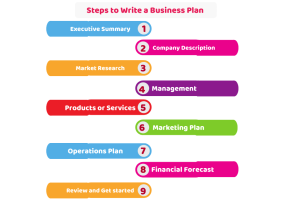A business plan is an essential tool for entrepreneurs, providing insight into the viability and growth of their idea and plans to

implement them. A comprehensive business plan may also serve to secure investment or unify team members around the company’s vision.
Writing a business plan is a time consuming and laborious task, which should involve extensive research. There are ways in which entrepreneurs can save both time and energy when creating their plans, however.
Consider your target audience when writing the business plan; this will not only inform its overall tone and style but will also determine which sections to emphasize. For example, if writing it to attract investment from banks or investors it will need to be more comprehensive than when written for internal use only.
Do not skip the market analysis section. This will give your reader a detailed understanding of the size, growth history and current potential of your industry. Be sure to define both target markets as well as demographic data such as age, income and geographical location – this information should help assess whether your product/service fits into existing market structures or if any barriers to entry must be overcome before moving forward with any strategy or plans.
Management and Organization Section – This section of your business plan should give a clear picture of who is running the company, their qualifications and backgrounds as well as its legal structure. Including this information ensures it can be easily understood by potential investors.

Never overlook a SWOT analysis of competitors to get an accurate picture of the competitive landscape and assess how your own business can thrive in such an environment.
Be sure not to forget the financial section! This part of your business plan demonstrates its viability, so place it last after covering executive summary, products/services, marketing, operations and personnel sections. In this final section you should include all financial data such as profit/loss statements, cash flow projections and balance sheets.
An effective business plan can serve as an invaluable asset in creating the foundation for any new enterprise, so taking time and care in its creation is paramount to its success. By following these simple tips, entrepreneurs can lower the risk of creating plans with mistakes or missing key details – ultimately leading to more productive and successful businesses! Thank you to Startup Professionals Group for this helpful article.